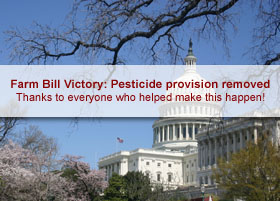Farm Bill Victory: Pro-pesticide provision removed!
 Together
we have achieved an important victory in the Farm Bill, successfully striking
statutory language forbidding USDA from curtailing pesticide use under
the Conservation Title.
Together
we have achieved an important victory in the Farm Bill, successfully striking
statutory language forbidding USDA from curtailing pesticide use under
the Conservation Title.
The good news is that
the language in the Farm Bill adopted by the House-Senate Farm Bill conference
committee eliminates language that would have prohibited the Secretary
of Agriculture from “discriminating against” or “prohibiting”
pesticides. Instead, the committee adopted conference “report language”
accompanying the bill that affirms the status quo –that is, USDA
does not have a regulatory role in restricting pesticides or establishing
legal uses, a function reserved for EPA. However, in terms of USDA’s
involvement in addressing pesticide contamination, the report language
(after getting passed the gratuitous ‘EPA pesticide registration
establishes safety’ wording) recognizes that USDA “mitigation
measures regarding pesticide use are entirely consistent with the current
regulatory program administered by EPA.” The conference report language
is copied below.
On a related note, we are happy that provisions in support of organic
agriculture are included in the 2008 Farm Bill Conference Report. The
adoption of the organic provisions, and the affirmation of USDA authority
to curtail pesticide use or adopt “mitigation measures,” enables
the Department to play an increasingly important role in helping to reduce
pesticide contamination and advance environmental and organic practices.
Of course, this may all be a warm-up exercise if the threatened presidential
veto of the Farm Bill is not overridden by Congress. The bill just passed
the House; ask your U.S. Senators to support the 2008 Farm Bill Conference
Report.
Thanks for your work on this!
Conference
report language
(29) No discrimination against use of registered pesticide products or
classes of pesticide products
The House bill prohibits the Secretary from discriminating against the
use of specified registered pesticide products or classes of pesticide
products in establishing priorities and evaluation criteria for approval
of plants, contracts and agreements under the conservation title of this
Act. (Section 11305) The Senate amendment contains no comparable provision.
The Conference substitute strikes this provision. Insomuch as the underlying House provision was a restatement of long-standing policy of the Natural Resources Conservation Service (NRCS), the managers recognize that statutory language is unnecessary.
The House provision referred to pesticides registered by the Environmental Protection Agency (EPA) in accordance with the Federal Insecticide, Fungicide and Rodenticide Act (FIFRA) and the Food Quality Protection Act (FQPA). A FIFRA registration implies that uses of pesticides have been deemed by EPA to have met established standards of safety to human health and the environment when used in accordance with the label. Under various conservation programs authorized in Title II, the managers have directed the Secretary to establish priorities and evaluation criteria to ensure the efficient and effective use of resources. However, it is not the intent of the managers to undermine the regulatory framework for the legal use of registered pesticides while implementing various conservation programs in this Title. Therefore, in establishing priorities and evaluation criteria for the approval of plans, contracts and agreements under Title II of this Act, it is the expectation of the managers that the NRCS shall neither prohibit the use of specific registered pesticides or classes of pesticides, nor advocate for the use of alternatives to registered pesticides or classes of pesticides.
The managers intend
for NRCS to assist farmers wishing to adopt new technologies and specific
pest management strategies that contribute to agricultural production
and environmental quality. For example, programs that assist farmers.
In developing risk mitigation measures regarding pesticide use are entirely
consistent with the current regulatory program administered by EPA and
would not be in conflict with Congressional intent.








